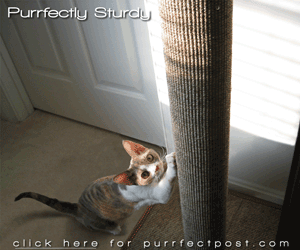Why Does My Cat Eat Plastic?

Does your cat do everything she can to get ahold of your plastic grocery bags? Do you find tiny cat-tooth marks in your sandwich baggies? Do you have to lock up garbage bags, packaging, dry-cleaning bags, cups, straws, and all other plastic items in your home so your cat doesn't chew on them?
If you have a cat that loves to lick, chew on, or eat plastic, you're not alone. Cats that do this are in the minority, but it's still common enough that people ask their veterinarians about it fairly often. So why would a cat eat plastic?
Your Plastic-Loving Cat Is Demonstrating Pica
Pica is a medical term that means having the propensity for chewing on or eating non-food items. Cats may suffer from pica for a number of different reasons including:
- Nutritional deficiencies. Some extreme deficiencies in nutrients can cause pica. However, this is rare and usually does not result in a cat relentlessly looking for one particular type of item, such as plastic, to chew on or eat.
- Other medical conditions. Certain problems such as dental disease, diabetes, brain tumors, gastrointestinal issues, hyperthyroidism, and anemia can cause pica in cats.
- Stress. Strained relationships with other pets or humans in the home, not enough play-time, storms, and medical problems are all examples of things that can cause stress to cats. Stress and anxiety can lead to many unwanted behaviors in cats that are trying to find an outlet for their distress. Plastic-chewing is one such possible behavior, which in this case could be compared to nail-biting in humans. You can learn more here: "Stress in Cats."
- Obsessive-compulsive disorder. In rare cases, a cat's stress problem may lead to a full-blown OCD issue. These cats may obsessively seek out plastic, sometimes even forgoing normal activities to do so.
- Predatory drive. Something about the sound and feel of the plastic may remind your cat of catching and eating prey.
- Curious personality. A cat that licks, chews on, or eats plastic may simply enjoy doing it. This is especially common in the case of kittens that are generally exploring and learning about all kinds of things in their environment. Your cat may have discovered that plastic is pleasurable for her to chew on, so she keeps doing it.
You can learn more about cats that chew on or eat non-food items here: "Pica in Cats: Why Cats Eat Strange Things."
What Can Be Done About a Cat Eating Plastic?
If your cat chews on plastic, you should be concerned. Ingesting plastic may not only result in minor problems such as vomiting and diarrhea, but it can also cause a serious intestinal obstruction that may require surgery. Plastic can be a choking or suffocation hazard, too, and plastic bags can be a strangulation danger. Hard plastic items can cause damage to sensitive mouth tissues when they are chewed.
Here are some things you can do if your cat licks, chews on, or eats plastic:
- Visit your veterinarian. Having your cat checked out for a medical problem is always the first step when you are dealing with any out-of-the-ordinary feline behavior.
- Increase interactive play. Boredom can play a role in many feline behaviors such as plastic-chewing. Making time to play with your cat daily can enrich her life and decrease her tendency to engage in unwanted behaviors.
- Use prey-mimicking toys. Make sure you have and use lots of cat toys that mimic the behavior of prey. wand toys that can be made to move like birds, mouse toys that you can cause to scoot around like rodents, hide and seek games with toys . . . these can all allow your cat to exercise her predator instincts and help her be happier and healthier.
-
Provide enrichment while you're away. Boredom or stress can set in for your cat when you leave her alone. You can provide ways to keep her active and happy that can decrease unwanted behaviors such as seeking and eating plastic. For instance, separate her daily food into several small bowls and hide them around the house for her to "hunt" and find. You could also leave a puzzle toy that releases treats for her to work on while she's alone. Cat perches that are set up to view the outdoors can also be a great way to provide extra enrichment for your cat. She can watch the goings-on outside while you're gone.
- Have plenty of scratching posts. Cats release stress, mark territory, and exercise by scratching. Having plenty of good scratching posts around can decrease unwanted behaviors in cats.
- Behavior modification. You can use this technique if you are nearby when your cat starts chewing on something plastic. Redirect her attention by calling her or throwing a toy in the opposite direction as the targeted plastic item. Praise her when she leaves the plastic to pursue the more acceptable behavior. You will need to repeat this exercise often, gradually showing your cat that she gets more positive reinforcement from ignoring plastic bags than she does from chewing on them.
- Keep plastic put away. Because of the possible health hazards to cats associated with chewing on and eating plastic, everyone in your home should be aware of the importance of keeping all plastic out of her reach.
If your veterinarian feels that your cat is truly experiencing an obsessive-compulsive issue, he or she may prescribe medications to be used short-term to enhance the efficacy of the behavior modification work you are doing at home. Never give your cat any medications without talking with your veterinarian first.
You May Also Like These Articles:
How to Decide on an Indoor or Outdoor Lifestyle for Your Cat
Sisal Fabric: The Best Material for Cat Scratching Posts
Cat Not Using Litter Box? Inappropriate Urination in Cats
The Dangers of Strings, Ribbons, and Yarn for Cats
Notice: Ask-a-Vet is an affiliated service for those who wish to speak with a veterinary professional about their pet's specific condition. Initially, a bot will ask questions to determine the general nature of your concern. Then, you will be transferred to a human. There is a charge for the service if you choose to connect to a veterinarian. Ask-a-Vet is not manned by the staff or owners of CatHealth.com, and the advice given should not delay or replace a visit to your veterinarian.





